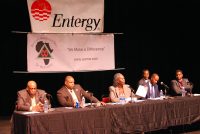African American Men of Westchester Forum Discusses Criminal Justice, Policing

By Andrew Vitelli – Spanning the spectrum of roles across the criminal justice system, panelists at Friday’s forum hosted by African American Men of Westchester (AAMW) held different views on many of the issues facing police and the courts in America. But in response to a question from one audience member, who suggested that the system is biased and that many young black men believe it is beyond repair, they were all able to get behind one suggestion.
“Become part of the system,” Jerome Clarke, a senior investigator at the Westchester County District Attorney’s Office, said at the forum held at Westchester Community College’s Hankin Academic Arts Theater, with his fellow panelists agreeing. “If more young people become part, I’m not saying it’s going to automatically become great, but it will make a difference.”
Clarke was joined by a retired detective, a civil rights attorney, a state supreme court judge, and a probation officer, as the night’s discussion focused on what changes were needed in the justice system and how people should interact with police and the courts.
“What we’re trying to do, as part of our mission as an organization, is bring information to the community and help with the dialogue to show a positive way in which conflicts can be resolved,” AAMW President Eric Eller said at the beginning of the forum. “How situations can potentially be avoided, and the proper way to respond in different situations.”
Mayo Bartlett, a civil rights and criminal defense attorney, said many police officers are poorly trained or not equipped to be officers.
“I’m not here to suggest to you that most police officers are bad people. I will suggest that far too many do not know their rules and regulations, do not know their protocol,” said Bartlett, who represents the family of Kenneth Chamberlain, a 68-year-old man fatally shot by White Plains police in 2011. “There are people out there who have no business being law enforcement officers at all. They have no temperament whatsoever.”
Daymon Yizar, a retired detective from the Greenburgh Police Department, acknowledged there are problems within policing, saying, “If you were a punk before you got a badge, now you’re a punk with a badge.” But he noted that the vast majority of encounters with police end without incident, and said the media has put forward a narrative of conflict with police.
“Check your facts. Don’t just go by what the media puts out there,” Yizar suggested. “They don’t necessarily put out what’s truthful or factual.”
The panelists also discussed how to act if approached by police, stressing that it is better to obey orders and defend yourself in the court system than to argue with or run from an officer.
“The last thing I want anyone in here to do, if you’re ever stopped by the police, is to get into any type of verbal confrontation. It’s not going to go well for you,” said Yizar. “We’re there to protect and serve, but we’re not there to back off.”
While the panelists agreed that there are serious problems within the criminal justice system, they differed in the degree to which they believed the system is flawed.
“Having been in the criminal justice system for 24 years, I don’t know that it’s very sound. I tend to think it’s not,” said Bartlett, noting that the U.S. has the world’s highest incarceration rate. “Something must either be broken with the people who live in this country or the system itself.”
To this, Yizar replied, “Nothing is perfect. It’s not a perfect world. It’s what we have.”
Janet Malone, a New York State Supreme Court Justice, emphasized the need to put forward reforms rather than simply identify problems.
“It’s easy to say, ‘It’s broken,’” said Malone. “We all know what the problems are. But how are we going to fix it? And this is the only system that we have.”
Malone, who has also worked as an Assistant District Attorney in Manhattan and later as a family court judge, pushed back a bit on some of the criticism over aspects of the justice system; she defended the secrecy of the grand jury process, saying it allows people to come forward and testify who otherwise wouldn’t.
“I don’t think that our young citizens or people in general should believe that the law is no longer for them, that the law is against them,” Malone said. “We have to have dialogue.”
Clarke spoke about the challenges of prosecuting a police officer.
“What’s tough about arresting police officers and prosecuting them in a lot of ways is just intent. It’s hard to prove, because you’ve got to show that that police officer went there with an intent to commit the crime, just as anybody else,” Clarke said. “The burden of proof on the prosecutor’s side, especially [when the defendant is] somebody of uniform service, is very difficult to go by.”
Sylvester Price III, a Westchester County Probations Officer, asked the audience to push for “Raise the Age” legislation in New York to change the age a person can be tried as an adult from 16 to 18, in line with most other states. Price also called for young black and Latino Americans to consider careers as probation officers.
The forum, sponsored by Entergy, drew about 20 audience members. It was moderated by Olney Reynolds, the vice president of AAMW. For more information, visit AAMW.com.

Examiner Media – Keeping you informed with professionally-reported local news, features, and sports coverage.
